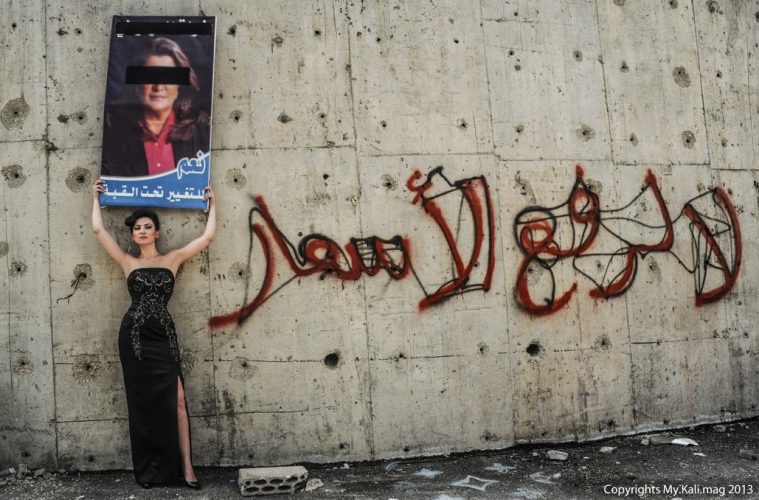Photographs by Agnes Montanari
Interview and art direction by Khalid Abdel-Hadi
Sitting Editor: Eliza Marks
Make-up Nada Al-Agha
Hair Mahmoud Karajogly
Digital art work by Atef Daglees
Making of video by Ala’a Abu Qasheh and Mustafa Rasheed
Special thanks to Dima Moris and Ala’a S. for assisting My.Kali’s team on location
Permitted by RFC (Royal Film Commission)
This feature is in collaboration with Project: Manifesto
Amman – Jordan
My.Kali is fired up as we throw open the doors to a year filled with statement works. We will embrace of all things modern and retro, and the sharp shocks of personal politics reigns supreme. And, we would like to shine a special light on Widad Shafakoj.
A first impression is the what occurs the first time a person encounters another and forms an image about him/her/them. Sometimes these impressions are actually accurate representations of the person, especially if all parties are honest in that encounter.
Widad Shafakoj leave a first impression that is far from a vague. She lets her personality show with all its charm and quarks. It was love at first sight for My.Kali since we googled her! Something about her being yells “upward momentum.” This woman who is featured in renowned film critic Najeh Hasan’s book will become surely make her mark on history and documentary.
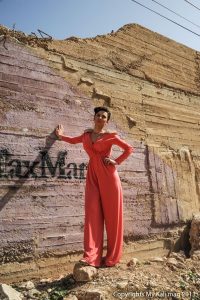
Pink silk jumpsuit peal beaded shoulder detailing, Bijou, found at Pink Dust. Beige pumps, Karen Millen
You’re graduated with a degree in interior design, and were also enrolled in SAE to study film-making. These seem like two opposing majors, two opposing interests. Was your success as an up-and-comer and successful shift into film a surprise?
I started in film as a designer, and I still work a lot as an art director on film sets. I didn’t expect major success from a film I made as a school project, but that showed me how capable I was, especially considering that most of what I had learned about film was from designing film sets. I guess these two majors ended up complementing each other. It all worked out perfectly.
You generally practice documentary filmmaking, which involves presenting facts objectively and without editorializing. Does it ever get “too real” for you, ortest your emotions?
Documentary filmmaking is about being real. It’s about touching on issues that most wouldn’t dare to go to because of how real they are. I consider myself a realist, and no reality is too hard for me. Someone needs to get it done.
Many believe that a near-death or traumatic experiences can change the trajectory of one’s life. In what ways has your work added to your personality or changed you?
The experiences and the people I meet doing what I do open my eyes to many things that would never occur to me in everyday life. It’s refreshing and mind boggling at times. I enjoy it and I love bringing these stories and experiences to light so others can also share in and be exposed to these issues.

Black vintage top with gold beaded detailing, vintage leather bag, both Topsy Loves Sid, found at Mlabbas. Black trousers, patent leather heels, both Karen Millen
Do you experience culture shock when practicing documentary?
I did a lot, but I think I now have certain expectations. At the end of the day, the most shocking thing is the cultural differences that exist between people who live only minutes away from each other.
What’s your relationship with your subjects after you finish the filming? Do you follow up or does it end when the whole thing ends?
I am always following up, but I do somehow move on from one subject to another. I like to give all I have to that which I working on next. That said, every subject is close to my heart and will always have a fair share of my attention.
Amman is a city with which many have a love/hate relationship, and the things that people love or hate about it could be common, peculiar, or personal. What are some of the things that you, personally, love or hate about Amman?
I love Amman. It’s my city, my comfort zone, and the place that made me. I dislike the judgment, the injustices, and the lack of motivation that many of us have in here. I wish people would love, support, respect and accept each other more.

Signature stretch satin purple and black dress, black satin baroque jeweled clutch, both Karen Millen
You told OC Magazine a while back, “I’m always going to be looking for more controversial subjects to document.” Now, My.Kali is documenting you in a publication deemed as controversial and unconventional. Do you feel connected to some of the extreme differences that meet you in your city, Amman, and what this interview and its visual are highlighting?
My.Kali, along with Project Manifesto, is working on a great campaign. Projecting it in the artistic yet sarcastic way that you do helps the audience relate to it, and that’s one of the major strengths of film. We now have means to connect to people using multiple methods, and talking about controversy in the ways that we do makes it more relatable, sweeter on the eyes, and more accessible. I’m all for it.
You’ve witnessed surreal things and experienced a broad range of emotions during your shoot, including things related to classism, sarcasm, sugar-coating, and the general awkwardness or tension of mediating difference. One of the major aspects, though, is the celebration of cultural differences within Jordan. Do you think this celebration is becoming part of every Jordanian?
I think it should be a part of every Jordanian, for it is a part of our daily lives. It is hard for one side of Abdoun to accept the other side of Abdoun, I feel, but I wish we didn’t have this problem. During this shoot, I witnessed a new sense of openness and praise to what both “types” of Abdounis do. It was a fun experience, and I feel it’s necessary to expose those two sides to each other more, in addition to other elements of local diversity.
Do you think paradoxical nature of Amman’s is part of the city’s charm? Could it be inspiring?
It definitely is both charming and inspiring. We can travel from old to new, rich to poor, free and open to conservative and traditional, in basically no time. This extreme difference is also something I do not like about it, though. I wish everyone had the same quality of education, for example, as this would help minimize some of these major differences that divide us.
“I love Amman, it’s my city, my comfort zone, and the place that made me. I dislike the judgment, the injustice, and the lack of motivation we have in Amman though.”
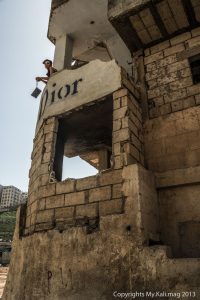
Signature stretch satin purple and black dress, black satin baroque jeweled clutch, both Karen Millen
Do you feel that Amman is a friendly city for those who want to hang out by themselves? Have you ever went out chilled at a cafe on your own with a book or a magazine?
I feel it totally is! We have many places in Amman made for that. I love chilling on my own with a book or my laptop, but I don’t do it as much as I probably should.
One of the major controversies that comes out in this diversity is rules and laws regarding women. For example, Penal Code Article 308 gives a rapist the right to marry his victim! For a woman who is so driven and in-control of her life and career, what’s your take on what’s known as the “rape-law” and what it represents?
I think, along with many weak, shameful, and incomprehensible laws in Jordan. This law must be instantly removed for it defies our Human Rights agreement, is plain wrong and only takes Jordan backwards.
Do superwomen really exist?
A woman shouldn’t be considered super for her outstanding achievements, these are the least any woman can do! I think superwomen live in mothers; the superwomen I know are mothers.
Women in this country get harassed all the time. Can you us about a specific situation in which you were harassed, and what did you do about it or what do you think you should’ve done about it?
When it comes to harassment, we females witness it a lot. It is almost impossible to remember all the incidents. In such situations, I hate keeping my mouth shut. I feel like I want to talk back, but it’s not always easy.

black and green sequined dress, Bijou, found at Pink Dust. Patent leather heels, Karen Millen
In an earlier conversation, you commented, “My family think I’m nuts sometimes,” in the context of talking about the idea of adopting and including that child in your family village, because many children are born in different circumstances. How does this idea of adoption fit within our society and traditions of family structure? Hypothetically, how can you make it work?
I don’t know exactly how it would fit in our society, but I think when you’re willing to do something that major, it’s basically your decision and not society’s. I still really believe in that and would still like to make it happen. I know many people in Jordan and the Arab world with adopted children and I salute them!
Many people do accept LGBTQ (Lesbian, Gay, Bisexual, Transsexual/Transgender, Questioning/Queer) people, but don’t accept the idea of them being parents. How might your discussion of adoption impact the idea of gay parenting?

black and gold stripped dress, Bijou found at Pink Dust. Patent leather heels, Karen Millen
Parents must give all their love and attention to their kids, to make sure they’re a 100% happy, satisfied, and protected. Many heterosexual mothers and fathers are not capable parents; many orphanages destroy children. If it takes a gay couple to save kids from all that madness and give them a better life and future, so be it.
Do you think that traditional notions of marriage are being challenged today, especially when it comes to homosexuality?
Well, we are seeing more and more people getting married without the traditional prerequisites. We recently saw an official civil marriage in Lebanon where a female Muslim and a male Christian got married. And yes, you can say that the traditional ways of marriage are fading slowly, but it needs time.
You are a women experiencing and expressing freedom in your 20s in the Middle East. How does your family feel about your liberalism? Do you think it might cause some obstacles later on, when it comes time to tie the knot (by traditional standards)?
My nuclear family accepts and understands me. They support me and in no way would stop me doing what I do. Getting married depends on me and whenever I am ready for that step in my life.
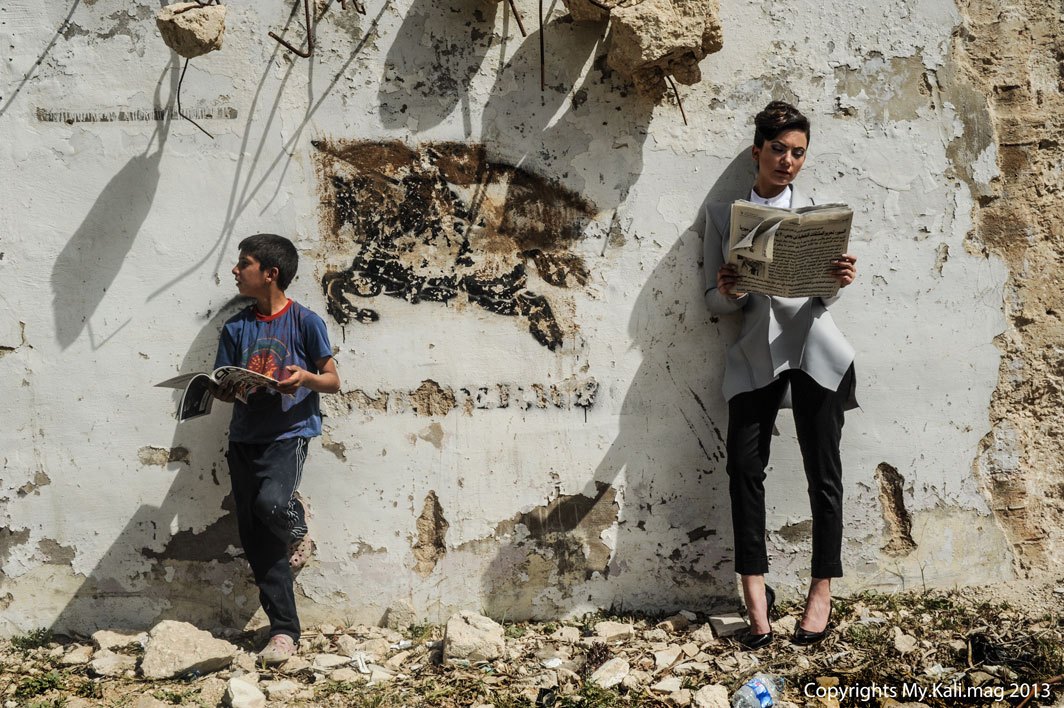
Grey strong shouldered blazer, Issa, found at Pink Dust. White crepe shirt, black trousers, patent leather heels, all from Karen Millen
You talked about reading an open letter on BBC Arabia that was directed to the King that was written by two men struggling with their identities, one an orphan and the other an “unknown percentage.” You managed to reach them and come to understand their situation and struggles, including them in your documentary, ‘ID 000.’ Many of our readers find it difficult to accept who and what they are in terms of their identities. What can you tell our readers in such a case?
You are who you are for a reason, and there’s no time to waste worrying about and struggling with your identity. Accepting who you are and loving it will put you in a much better place. Don’t let anybody tell you who you should be, and don’t let anything stop you from being whoever you want to be. I think that as long as you are comfortable with who you are and what you do, you should simply go with it.
Do you think acting would allow you to discover an exhibitionist side to yourself?
Probably, but I believe one can also convey her opinion, thoughts and point of view from behind the camera. There is a kind of rush that comes with acting, though, that is beautiful and addictive.
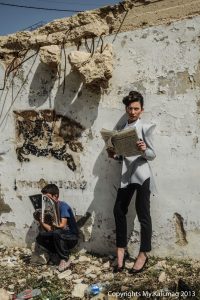
Grey strong shouldered blazer, Issa, found at Pink Dust. White crepe shirt, black trousers, patent leather heels, all from Karen Millen
You expressed an interest in acting earlier, would you ever play a lesbian role or in a traumatic state? If yes, how would you prepare for the role?
Just as is the case with any movie, I would need to consider the story line and its intended message, , and the character herself. A lot of research would has to be done to perfect any role you play.
What are your plans for the longer term?
I would like to continue to working with film and societal issues. I’m working on a personal project now, a film that tackles a serious issue in Jordan, and also as an art director on different projects, and making small films here and there. Whatever my plans end up being, I hope I’m always making a difference.
In your interviews you always appear composed. Have you always been confident?
Confidence grows with you, with your experiences and achievements. I’ve always been shy, but believed in myself.
One reader asked, ‘how do you manage your time; filming, family time, your personal project and socializing’?
You come upon days where the hours are not enough, and then you come upon others where there’s time for everything. I don’t have a specific routine that I follow, so everyday is interesting and different.

Signature stretch satin purple and black dress, black satin baroque jeweled clutch, both Karen Millen
CUT! What’s the most uncomfortable situation you’ve ever faced, maybe during filming?
Honestly, I haven’t faced any uncomfortable situations during filming. Should I consider myself lucky? Now that I’ve said that, I’m sure I’ll have plenty in the future.
What’s your “Last Friday Night” moment (considering Katy Perry’s music video/song), that leaves laughing or agitating?
Any Friday spent with the right group of friends is sure to end with everyone laughing; the other way is also true. If I’m with the right crowd, we’re bound to have an outrageous Friday night. And definitely do it all again.
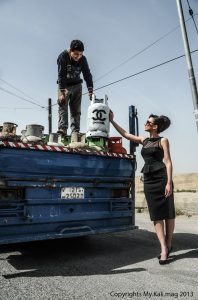
Pencil dress with mesh black, patent leather heels, both Karen Millen. Vintage Nina Ricci eyewear, Widad’s own
A meeting of minds! What are your favorite TV shows? Maybe character…
I have several favorite shows, one of my all time favorite characters is Karen from Will and Grace, she’s straightforward and extremely funny.
What’s your favorite sad song you like to listen to when you’re down or sad?
I don’t really have one, I’m maybe too old for that. But I do love “Oh Carol” by Neil Sedaka. It doesn’t sadden me but it brings back a lot of special memories.
What TV moments (maybe an interview, a video clip, a documentary, a certain moment on a TV show, or a movie) that makes you cry every time you see them?
I am not a crier, but unfortunate true stories and the news probably would sadden me the most. The first time I watched I am Sam I cried senselessly, but I think it was because I was generally upset that day. I never cried to it again, and I watched it over a million times.
.
When My.Kali’s team were on location days before the shoot to spray the walls with the brand names, many of the people from the area gathered around and asked of what the symbols meant, the team replied that they were logos of brands that are super expensive. Some of the kids didn’t believe that a pair of shoes or one piece of clothing could cost more then their house. And some actually thought that we were spreading religious and cult symbols in the area, like what they did to Louis Vuitton logo, or masonic like Burberry’s, as they used mud to cover it using their own hands, and wrote next to it ‘no to the cross’. Project: Manifesto and My.Kali wanted to create a dialogue between the brands and people of the area.
Watch the making of ‘Label Protest’ in Hay Al Qayseyyeh, below:
Watch ‘Label Protest’ mini-film of Widad Shafakoj below:

